| |
Group/Joint Activities - Training
Annual Refresher Training
The Palm Beach County MS4 permit requires that permittees provide training on three topics. Annual follow-up (or "refresher") training is required for those that have received the initial training. The three topics are:
- Identification & reporting procedures for a suspected illicit discharge or dumping in the MS4 for all appropriate permittee personnel (including field crews, fleet maintenance staff, and inspectors) and contractors. (Part III.A.7.c)
- Spill prevention, containment & response procedures (including techniques for mitigating pollution from spills) for all appropriate permittee personnel (including field crews, firefighters, fleet maintenance staff, and inspectors. (Part III.A.7.d)
- Stormwater management and erosion and sedimentation control BMPs for construction sites for site plan reviewers, site operators, and site inspectors. Construction site inspectors must be certified through the Florida Stormwater, Erosion, and Sedimentation Control Inspector Training program, or equivalent. (Part III.A.9.c)
The Palm Beach County MS4 permittees carry out a joint training program that is available to all permittee personnel, as well as contractors and private individuals.
Illicit discharge, spill prevention and sedimentation & erosion control training topics are presented at a group training session, held at least once each year, typically in March. Training description and attendance logs are maintained for each training session.
View Past Refresher Training Summaries & Attendance Logs
- 2024, March 20
Training Attendance
- 2023, March 10
Training by Cheryl Moore
- 2022, March 17
Training by Cheryl Moore
- 2021 May, 12 & 13
Agenda
- 2021, March 17
Excal Visual Video Training
- 2020, March 11
Excal Visual Video Training
- 2019, May, 22 & 23
Steering Committee meeting
- 2019, March 20
Excal Visual Video Training
- 2018 May, 23 & 24
Steering Committee meeting
- 2018, March 21
Excal Visual Video Training
- 2017 May, 23 & 24
Steering Committee meeting
- 2017, March 15
Excal Visual Video Training
- 2016 May, 25 & 26
Steering Committee meeting
- 2016, March 16
Excal Visual Video Training
- 2015 May, 20 & 21
Steering Committee meeting
- 2015, March 18
Excal Visual Video Training
- 2015 February, 11 & 12
Steering Committee meeting
- 2014 May, 27 & 28
Steering Committee meeting
- 2014, March 19
Excal Visual Video Training
- 2013 December, 16 & 17
Steering Committee meeting
- 2013 May, 15 & 16
Steering Committee meeting
- 2013, March 20
Excal Visual Video Training
- 2012 May, 16 & 17
Steering Committee meeting
- 2012, March 21
Excal Visual Video Training
- 2011 May, 25 & 26
Steering Committee meeting
close
In addition, a Library of EXCAL Visual Training videos is available to the permittees anytime for use at in-house training sessions.
View Video Library
The permittees have purchased training videos from EXCAL Visual ( www.excalvisual.com) to assist in meeting permit training requirements. These videos may not be reproduced, but additional copies may be purchased from the vendor.
The videos include the following:
| 1. | Rain Check: This video provides instruction on good housekeeping, spill response, materials management, vehicle fueling and washing and other BMPs outlined in EPA's "National Menu of BMPs." The accompanying quiz and answer key are available. | 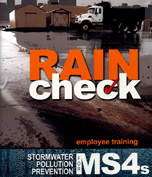
|
| |
| 2. | A Drop in the Bucket: The video focuses on employee training that describes concepts and practices of stormwater pollution prevention. The video describes stormwater pollution and its negative effects on people, wildlife, and the environment. It includes good housekeeping, spill prevention, exposure minimization, maintenance, and spill-clean up. It also provides an overview of the work practices that can be effective for stormwater pollution prevention. | 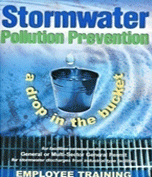
|
| |
| 3. | Spills & Skills: The video is designed to help train non-HAZWOPER employees on dealing with a hazardous material (or hazardous waste) spill, leak or release. What to do if you discover a hazmat release? How to determine if the release requires HAZWOPER—trained responders or not? If it is a hazmat emergency release (HAZWOPER event), what to do then? If it is non-HAZWOPER (an “incidental release”), the discreet steps involved to clean it up. The “step-across” test. The clean-up supplies and equipment you should expect to find in the spill locker. Different styles of absorbent (loose, pads, pillows, socks) and how to use each. How to use all the equipment and supplies safely and effectively. How to manage the clean-up wastes. Post clean-up measures. | 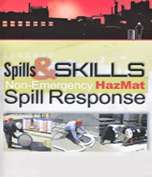
|
| |
| 4. | Storm Warnings: Storm Water Pollution Prevention - Describes Best Management Practices that are crucial for compliance with facility Stormwater Pollution Prevention Plans including: good housekeeping, exposure minimization, and soil-cleanup. | 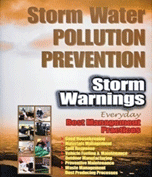
|
| |
| 5. | Ground Control: Stormwater Pollution Prevention for Construction Sites - The video focuses on BMPs that are widely used at most construction sites including: silt fences, stabilized entrances/exits, drop inlet protectors and others. The program illustrates how these BMPs work and how they can fail. Employees are encouraged to promptly report any failing BMPs. By making all employees “look-outs” for BMP problems, this training program is an important part of the required BMP maintenance program. | 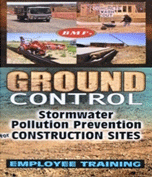
|
| |
| 6. | Controlling Oil: Spill Prevention, Control & Countermeasure (SPCC) - This 20 minute video instructs employees on SPCC Plans, oil pollution regulations, effective oil storage and oil transfer procedures. It also instructs employees on “discharge procedure protocols” first response measures to take when a discharge is discovered. The video also addresses site security measures to take to protect oil handling facilities against vandalism and terrorism. | 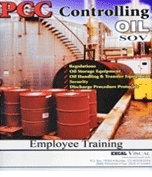
|
| |
| 7. | Storm Watch: Municipal Stormwater Pollution Prevention - The video focuses on BMPs that are important to many municipal operations such as good housekeeping, spill response, materials storage and handling, landscape maintenance, and street maintenance. Employees working in maintenance and other departments can benefit from this training video. The video also shows employees how to spot potential “illicit discharges” occurring around town. | 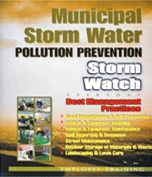
|
| |
| 8. | Illicit Discharge Detection & Elimination: Shows employees who travel around the permitted jurisiction how to spot a possible illicit discharge or signs of past discharges. It discusses direct and indirect discharges and shows employees what to look for at curb inlets, drop inlets and outfalls. It shows examples of the tell-tale signs often left by past illicit discharges. It encourages employees to be vigilant in watching for signs of illicit discharges and to report their suspicions to the storm drainage staff, Public Works Department or Environmental staff who can then initiate the process of tracking the source of the discharge and eliminating it. | 
|
| |
| 9. | Spill Prevention, Control and Countermeasure by the Numbers 24/7/365: The video is designed to familiarize employees and contractors with the fundamental rquirements as it applies at fixed facilities that store, use or handle oil in above ground contrainers (ASTs or portable containers such as 55 gallon drums). It shows employees and contractors at regulated facilities their role in the on-going process of oil spill prevention. It discusses the following topics:
- The scope of the oil pollution problem
- Oil pollution control laws and regulations and the SPCC rule
- General facility operations
- Oil storage equipement
- Operation and maintenance of spill prevention equipment
- Discharge procedure protocols
| 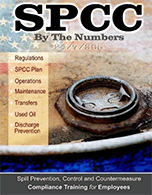
|
close
FSESCI Training
Each year, typically in May, the PBC Group sponsors an FDEP Florida Stormwater Erosion and Sedimentation Control Inspector (FSESCI) training course. FDEP course material is presented by an FDEP-approved trainer and certification testing is a part of the course. This course is sponsored in order to make the training and certification accessible to MS4 permittee staff and contractors in the area. Sign-in sheets for recent FSESCI training courses are available from the link below. View FSESCI Attendance Logs
FSESCI Certifications can be verified on the following FDEP webpage:
https://www.fsesci.com/verify/
Other Available Training (not required by MS4 permit)
Stormwater Management Personnel Training
Personnel training for managers, supervisors, field maintenance personnel, technicians, heavy equipment operators, and field staff are available from various organizations.
The Florida Stormwater Association (www.florida-stormwater.org) offers two stormwater operator certification seminars:
- FSA Stormwater Operator Certification - Level 1 The Level 1 program is intended to improve the knowledge and competency of stormwater management field personnel by providing high quality, consistent training that assures a recognized level of knowledge and skill. This two-day course is designed for field maintenance personnel such as foremen, technicians, heavy equipment operators, road stabilization crews, crew leaders, etc.
- FSA Stormwater Operator Certification - Level 2 The Level 2 program is intended to familiarize stormwater management supervisory personnel with the tools necessary to effectively implement your organizations goals and objectives. The curriculum includes leadership skills and communication, proper design of stormwater management systems, permitting requirements, operating budgets and stormwater utility fees. This two-day course is designed for senior-level foremen, managers and supervisors. Successful completion results in a Stormwater Operator Level 2 Certification from FSA and fulfills FDEP's training requirements of your MS4 permit for appropriate stormwater management personnel in Illicit Discharge Detection/Elimination and Spill Prevention Control/Countermeasures. Also, the course has been pre-approved to provide 6 parallel continuing education credits (CECs) for Certified Floodplain Managers.
The Florida Water Pollution Control Operators Association (www.fwpcoa.org) has three levels of stormwater management classes (C, B and A). All classes are week-long seminars. Prerequisites include years of experience in stormwater (1 to 5 years), and completion of the previous level class. FWPCOA also offers a 3-hour regional Stormwater NPDES Illicit Discharge Training course.
|
Upcoming Training Sessions
The next training event has not been scheduled yet.
MS4 Group 2025 Annual Refresher Training available for viewing.
Click here to view.
|
|









